Complete House Rewiring Guide: Costs, Process and What to Expect
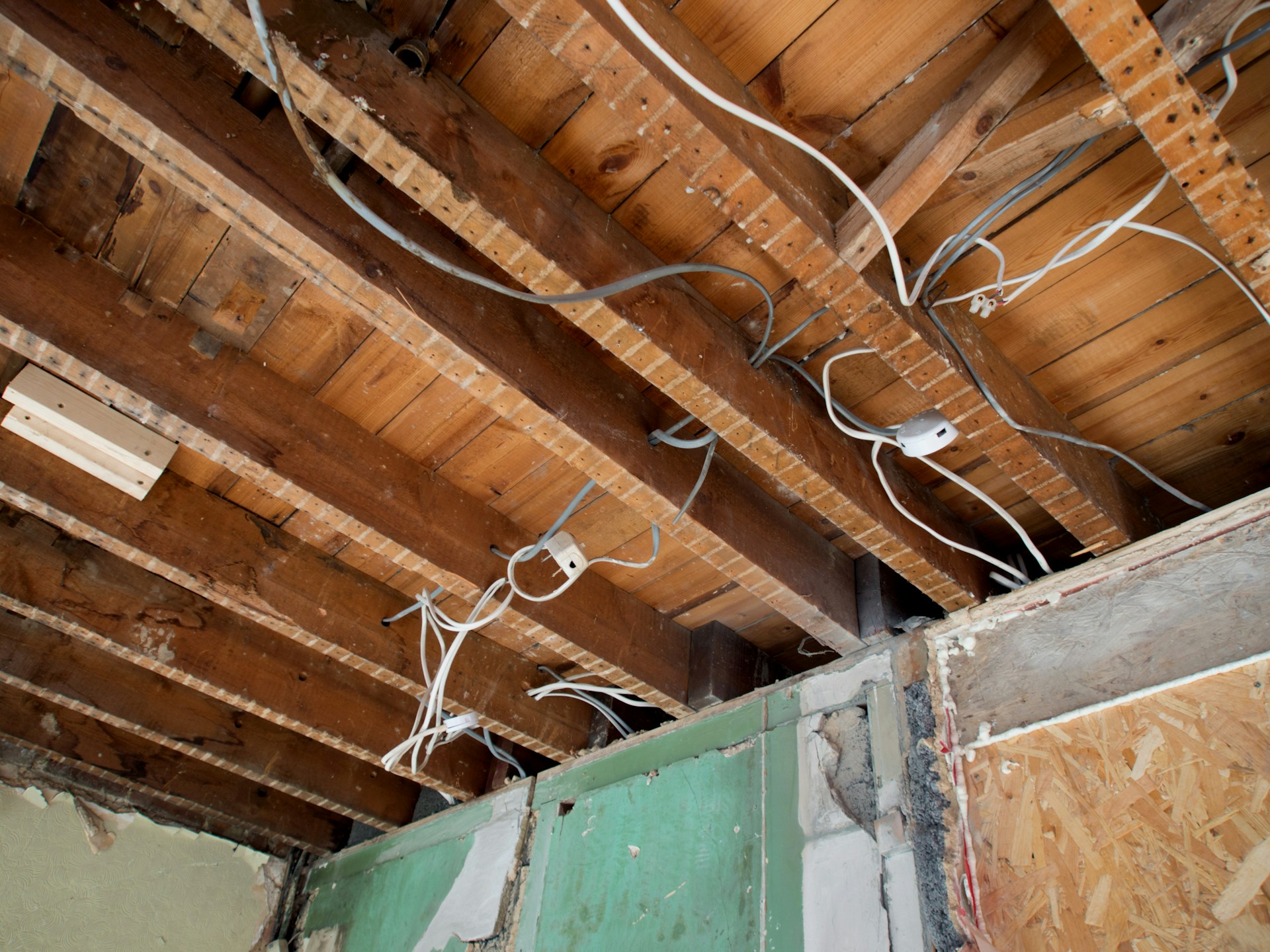
The easiest way to book quality trades
House rewiring represents one of the most significant electrical projects homeowners undertake, involving complete replacement of aging wiring systems, consumer units, and electrical installations to meet modern safety standards and power demands. Whether dealing with outdated wiring from the 1960s, planning major renovations, or addressing safety concerns, understanding the rewiring process helps homeowners make informed decisions about this substantial investment.
Professional electricians specializing in house rewiring possess the expertise, qualifications, and equipment necessary to safely remove old electrical systems while installing comprehensive new wiring that meets current building regulations and electrical standards. From initial assessment through final certification, qualified electricians manage every aspect of rewiring projects while ensuring minimal disruption and maximum safety throughout the complex installation process.
Quick Answer: Yes, qualified electricians can rewire entire houses and are the only professionals legally authorized to perform this work in the UK. Full house rewiring typically costs £4,000-£12,000 depending on property size, taking 5-10 days to complete. The process involves two main stages: first fix (wiring installation) and second fix (fittings and testing), culminating in electrical certification required for building regulations compliance and property sales.
Understanding House Rewiring Requirements
Complete house rewiring involves systematic replacement of electrical infrastructure throughout properties, addressing safety concerns while upgrading capacity to meet modern electrical demands and regulatory requirements that ensure safe, reliable power distribution.
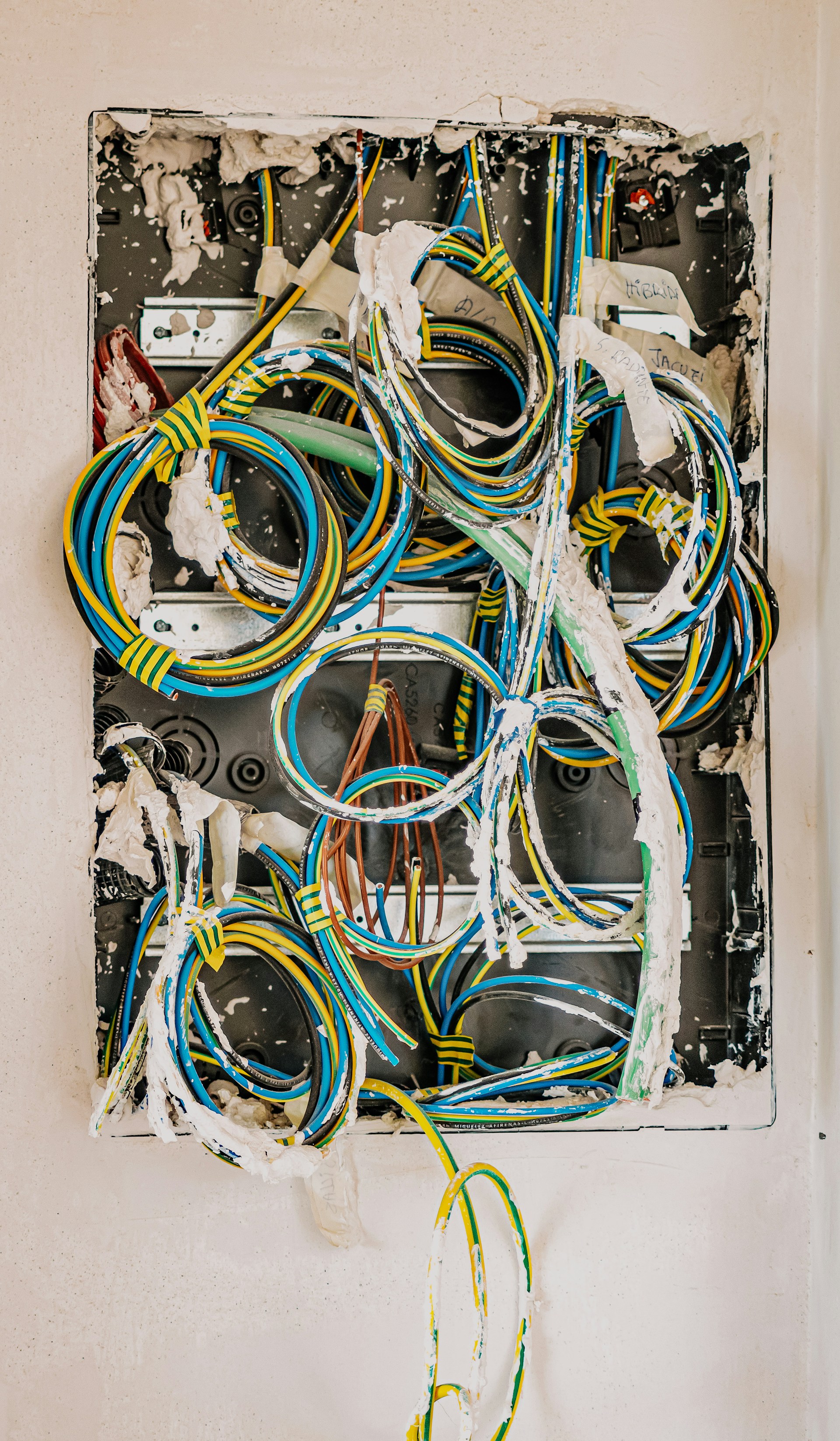
What Does House Rewiring Involve?
Professional house rewiring encompasses comprehensive electrical system replacement including wiring, consumer units, sockets, switches, and lighting circuits while ensuring compliance with current electrical regulations and building standards that protect property and occupants.
Complete Wiring Replacement forms the foundation of rewiring projects, involving removal of old cables and installation of new wiring throughout all rooms and circuits. Modern wiring utilizes contemporary cable specifications designed for enhanced safety, capacity, and longevity compared to outdated systems that may pose fire risks or operational limitations.
Professional rewiring includes assessment of existing routes, planning optimal cable paths, and installation techniques that minimize property disruption while ensuring comprehensive coverage. Modern installations typically include enhanced capacity for contemporary electrical demands including multiple appliances, technology systems, and lighting requirements.
Consumer Unit Upgrades represent essential components of rewiring projects, replacing outdated fuse boxes with modern consumer units featuring RCD protection, circuit breakers, and enhanced safety systems. Consumer unit replacement ensures proper circuit protection while providing capacity for additional circuits and safety features.
Modern consumer units include residual current device protection that immediately disconnects power during fault conditions, significantly reducing electrocution and fire risks. Professional installation ensures proper earthing, bonding, and circuit organization that meets current regulations while providing reliable protection systems.
Socket and Switch Replacement throughout properties ensures consistent standards while providing enhanced functionality and safety features. Modern electrical accessories include improved materials, better connections, and enhanced safety features compared to older installations that may lack adequate protection.
Professional accessory installation includes strategic placement planning, capacity assessment, and integration with modern electrical demands. Contemporary installations often include additional sockets, USB charging points, and specialty circuits for specific appliance requirements.
When House Rewiring Becomes Necessary
Several factors indicate when house rewiring becomes essential for safety, functionality, and regulatory compliance, helping homeowners recognize warning signs that require professional electrical assessment and potential complete system replacement.
Age-Related Wiring Deterioration typically occurs in properties with electrical systems installed before 1970, when wiring standards, materials, and installation practices differed significantly from current requirements. Older wiring may lack adequate earthing, proper circuit protection, or sufficient capacity for modern electrical demands.
Properties with aluminum wiring, cloth-insulated cables, or early PVC systems often require complete replacement due to safety concerns and performance limitations. Professional assessment determines whether partial upgrades suffice or complete rewiring provides better long-term solutions.
Safety and Compliance Issues including frequent circuit breaker trips, flickering lights, burning smells, or electric shocks indicate serious electrical problems requiring immediate professional attention. These symptoms often indicate wiring deterioration, overloaded circuits, or dangerous fault conditions.
Building regulation changes and insurance requirements may mandate electrical upgrades for older properties, particularly during major renovations or property sales. Professional electrical inspection identifies compliance issues while recommending appropriate upgrade solutions.
Capacity and Modern Electrical Demands often exceed older electrical system capabilities, creating overload conditions and safety hazards. Modern homes require significantly more electrical capacity for appliances, technology systems, electric vehicle charging, and contemporary lifestyle demands.
Professional capacity assessment determines whether existing systems can accommodate additional loads or whether complete rewiring provides necessary infrastructure. Future-proofing through adequate capacity planning prevents premature system overload while supporting evolving electrical needs.
How Much Does It Cost to Rewire a House in 2025?
House rewiring costs vary significantly based on property size, complexity, access requirements, and specification levels, though understanding typical pricing ranges helps homeowners budget appropriately while evaluating professional quotes and project scope. Use our electrician cost calculator to estimate rewiring costs for your specific property.
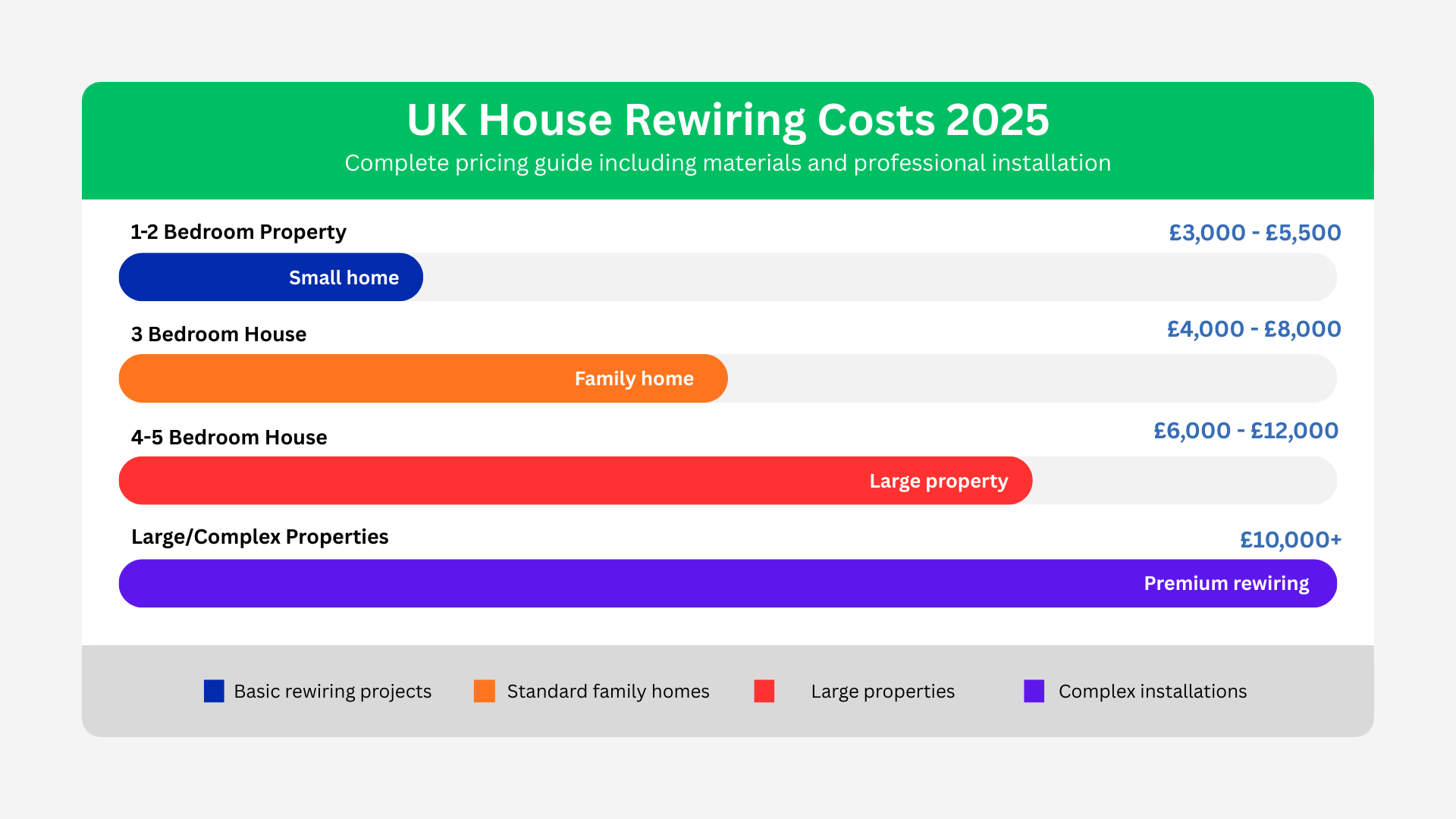
Standard Rewiring Cost Ranges
Professional house rewiring costs reflect labor intensity, material requirements, and project complexity while including professional fees, certification, and building regulation compliance that ensure comprehensive service delivery and regulatory conformance.
Property Size and Basic Cost Estimates provide general guidance for rewiring budgets, though individual circumstances significantly influence final costs through specific requirements, complications, and specification choices affecting both materials and labor.
1-2 bedroom properties: £3,000-£5,500 including materials and labor 3 bedroom houses: £4,000-£8,000 depending on size and complexity
4-5 bedroom homes: £6,000-£12,000 for comprehensive rewiring Large properties: £10,000+ for extensive installations
Professional quotes should include comprehensive cost breakdowns covering labor, materials, certification, and additional services ensuring transparent pricing without hidden charges. Accurate cost estimation requires detailed property assessment and specification agreement.
Labor Costs and Professional Fees typically represent 60-70% of total rewiring costs, reflecting skilled electrical work, project management, and certification requirements. Qualified electricians charge £60-£100 per hour including VAT, with project complexity and duration significantly affecting final labor costs. Understand how electrician hourly rates vary across the UK and what affects your final rewiring estimate.
Need a electricians professional?
Get instant quotes from 3-5 vetted local tradespeople. Compare prices, reviews, and availability—all in one place.
Rewiring projects typically require 3-17 days depending on property size and occupancy status, with empty properties enabling faster completion compared to occupied homes requiring careful coordination and daily cleanup procedures.
Material and Component Specifications including cables, consumer units, sockets, and switches typically account for 30-40% of total project costs. Material quality, quantity requirements, and specification levels significantly influence component costs while affecting long-term performance and reliability.
Modern installations include enhanced safety features, improved materials, and expanded capacity compared to basic specifications, justifying investment through superior performance and regulatory compliance. Professional material sourcing ensures compatibility while providing warranty coverage and performance guarantees.
Factors Affecting Rewiring Costs
Multiple variables influence final rewiring costs beyond basic property size, creating significant price variations for similar properties depending on specific circumstances, requirements, and complexity factors that affect both labor and material requirements.
Property Occupancy and Access Conditions substantially impact rewiring costs through working constraints, protection requirements, and coordination demands affecting project efficiency and completion timelines.
Occupied properties typically cost 25-50% more than empty homes due to daily setup, protection installation, cleanup requirements, and working restrictions that reduce daily productivity. Empty properties enable efficient working while minimizing disruption costs and timeline complications.
Access difficulties including narrow staircases, restricted parking, or architectural complications create additional challenges requiring extended labor time and potentially specialized equipment. Historic properties or unique architectural features often require customized solutions increasing both time and cost requirements.
Electrical System Complexity and Upgrades including smart home integration, specialty circuits, or enhanced specifications increase costs through additional materials, specialized knowledge, and extended installation time.
Contemporary electrical systems may include home automation, security system integration, electric vehicle charging points, and renewable energy connections requiring enhanced expertise and equipment. During rewiring, many homeowners also relocate outlets for improved layout and functionality. Specification upgrades provide enhanced functionality though require appropriate budget allocation.
Building Regulation and Certification Requirements ensure legal compliance while adding costs for professional certification, building control liaison, and documentation completion essential for property legality and insurance coverage.
Professional installations include Electrical Installation Certificates confirming regulatory compliance, essential for property sales, rental arrangements, and insurance requirements. Certification costs typically range from £100-£300 depending on installation complexity.
The Step-by-Step House Rewiring Process
Professional house rewiring follows systematic procedures ensuring safe, efficient installation while minimizing property disruption through careful planning, phased implementation, and comprehensive quality control throughout all project stages.
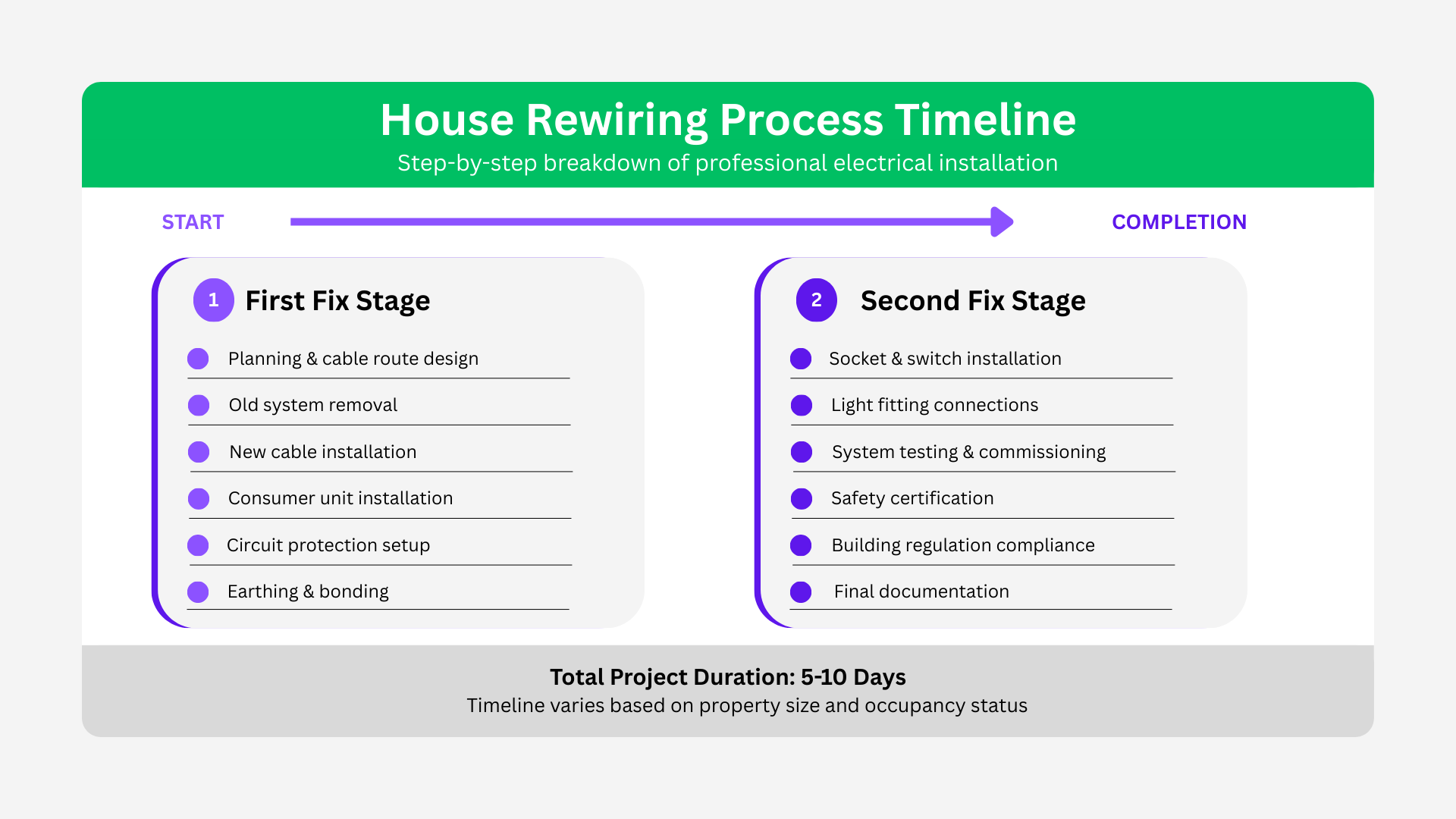
Stage One: First Fix Electrical Work
The rewiring process typically occurs in two main stages: first fix involving old wiring removal and new cable installation, followed by second fix including accessories installation and system commissioning.
Planning and Cable Route Design involves comprehensive property assessment, circuit planning, and cable route optimization ensuring efficient installation while minimizing structural impact. Professional planning includes capacity calculation, circuit distribution, and future expansion consideration.
Detailed planning prevents installation problems while ensuring adequate provision for all electrical requirements. Cable route planning minimizes wall damage while ensuring optimal accessibility for maintenance and future modifications.
Old System Removal and Cable Installation requires careful dismantling of existing electrical systems while installing new wiring throughout planned routes. Professional removal ensures safe disposal while preventing damage to other building services during extraction processes.
New cable installation includes proper routing, adequate support, and protection measures ensuring long-term reliability while meeting installation standards. Professional installation techniques ensure optimal performance while preventing future access problems or maintenance difficulties.
Consumer Unit Installation and Circuit Protection includes modern consumer unit mounting, circuit organization, and protection system installation ensuring comprehensive electrical safety and regulatory compliance.
Professional consumer unit installation includes proper earthing, main bonding, and RCD protection ensuring optimal safety standards. Circuit labeling and documentation provide clear system identification while supporting future maintenance and modification requirements.
Stage Two: Second Fix and System Commissioning
Second fix work includes new switches, sockets, and fittings installation with complete system connection and testing, culminating in comprehensive commissioning and certification procedures.
Accessory Installation and Connection encompasses socket outlets, light switches, and specialty fittings installation throughout properties ensuring consistent finish quality and optimal functionality.
Professional accessory installation includes precise mounting, secure connections, and proper earthing ensuring reliable operation while maintaining aesthetic standards. Quality installations provide long-term reliability while supporting user convenience and safety.
System Testing and Commissioning involves comprehensive electrical testing including insulation resistance, earth fault loop impedance, and RCD functionality verification ensuring complete system safety and performance.
Professional testing includes specialized equipment and systematic procedures verifying all circuits meet safety standards while identifying any installation defects requiring correction. Testing documentation provides evidence of system integrity while supporting certification requirements.
Certification and Building Regulation Compliance completes rewiring projects through professional certification confirming regulatory compliance and system safety standards essential for legal property use.
Electrical Installation Certificates provide essential documentation for property sales, rentals, and insurance purposes while confirming safety compliance. Professional certification includes ongoing support and warranty coverage providing long-term assurance and property protection.
Ready to hire a trusted electricians?
Compare quotes, read verified reviews, and hire with confidence. Our platform connects you with local professionals who are ready to help.
Instant Quotes
Responses within 24 hours
Verified Reviews
Real customer feedback
No Commitment
Choose when you're ready
How to Choose a Qualified Electrician for Rewiring
Professional electrician selection significantly impacts rewiring project success through expertise levels, service quality, and regulatory compliance ensuring optimal results while protecting homeowner interests through appropriate qualifications and comprehensive service delivery.
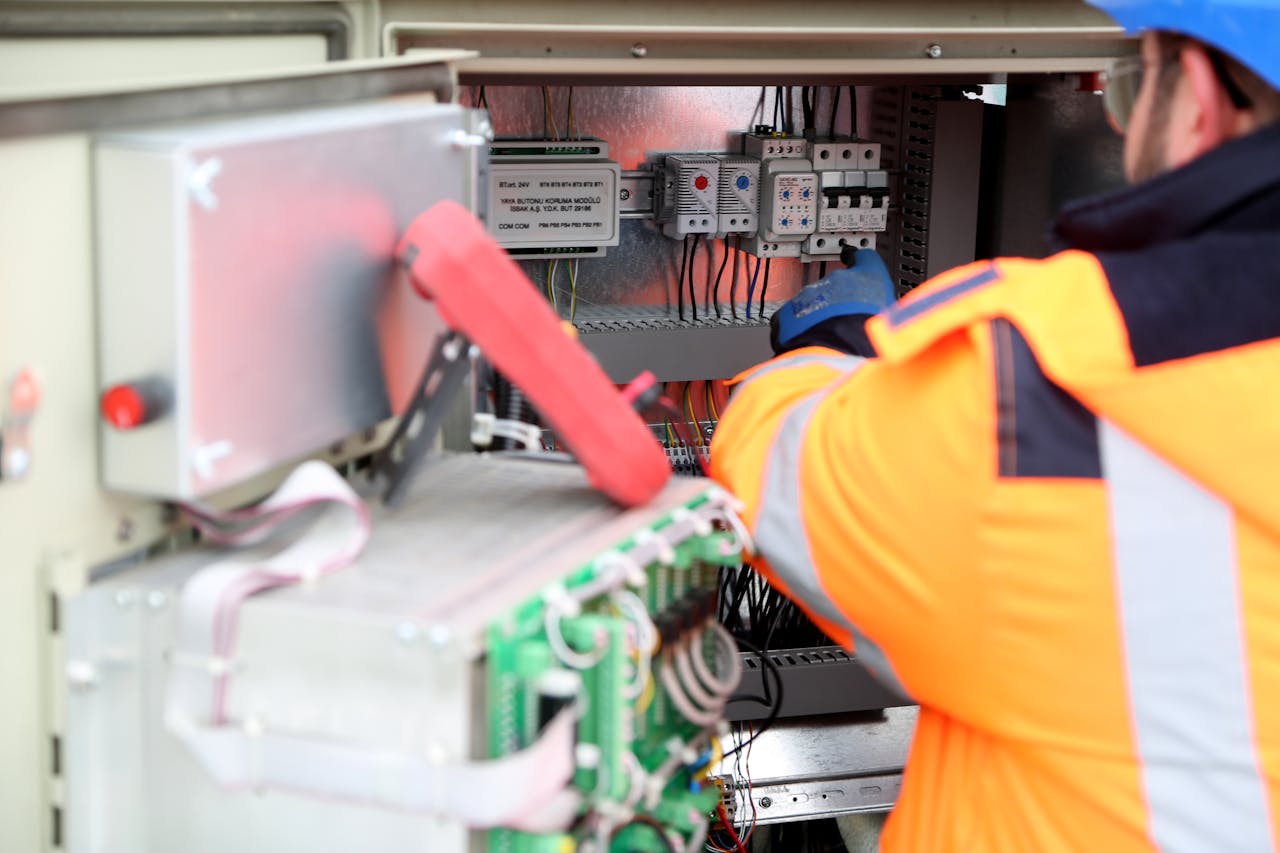
Essential Electrician Qualifications and Certifications
House rewiring requires specific qualifications, certifications, and professional memberships ensuring appropriate expertise while providing consumer protection through regulatory oversight and professional accountability standards.
Electrical Qualifications and Training including City & Guilds Level 3, NVQ Level 3, or equivalent technical qualifications demonstrate fundamental electrical knowledge and practical skills essential for safe, effective rewiring work.
Professional electrical training includes comprehensive safety procedures, regulatory knowledge, and installation techniques ensuring competent service delivery. Ongoing training maintains current knowledge while ensuring awareness of regulation changes and technical developments.
Professional Registration and Scheme Membership including NICEIC, NAPIT, or other competent person scheme membership provides consumer protection while ensuring professional standards and regulatory compliance.
Scheme membership includes regular assessment, continuing professional development, and complaints procedures protecting consumer interests while ensuring professional accountability. Registered electricians can self-certify work reducing building control costs while ensuring regulatory compliance.
Insurance and Professional Liability Coverage protects both contractors and homeowners through comprehensive public liability and professional indemnity insurance ensuring adequate protection against potential claims or installation problems.
Professional insurance coverage includes minimum £2 million public liability while comprehensive coverage protects against installation defects, property damage, and professional negligence. Insurance verification ensures adequate protection while confirming professional legitimacy.
Professional Service Evaluation and Selection
Electrician selection requires careful evaluation of experience, service quality, and project management capabilities ensuring optimal service delivery while protecting homeowner interests through appropriate professional standards and comprehensive service provision.
Experience and Specialization Assessment including house rewiring experience, similar project portfolios, and specialist knowledge ensures appropriate expertise for complex residential electrical installations.
House rewiring experience includes understanding of building integration, disruption minimization, and project coordination essential for successful completion. Specialist residential experience often provides superior service compared to general electrical contractors lacking specific expertise.
Quote Comparison and Service Scope Evaluation enables informed professional selection while ensuring comprehensive service coverage and transparent pricing preventing unexpected costs or service limitations.
Professional quotes should include detailed work scope, material specifications, timeline estimates, and certification provision enabling accurate comparison. Comprehensive quotes prevent disputes while ensuring appropriate professional compensation and service delivery.
Customer References and Professional Reputation provide insight into service quality, professional reliability, and customer satisfaction guiding selection decisions while confirming professional competence and service standards.
Reference verification includes direct customer contact while online reviews provide broader service quality indicators. Professional reputation reflects service consistency, problem resolution, and customer satisfaction essential for complex projects requiring extended professional engagement.
Preparing Your Home for Rewiring
Effective preparation significantly impacts rewiring project success through reduced disruption, improved efficiency, and cost control while ensuring optimal working conditions for professional electricians throughout complex installation processes.
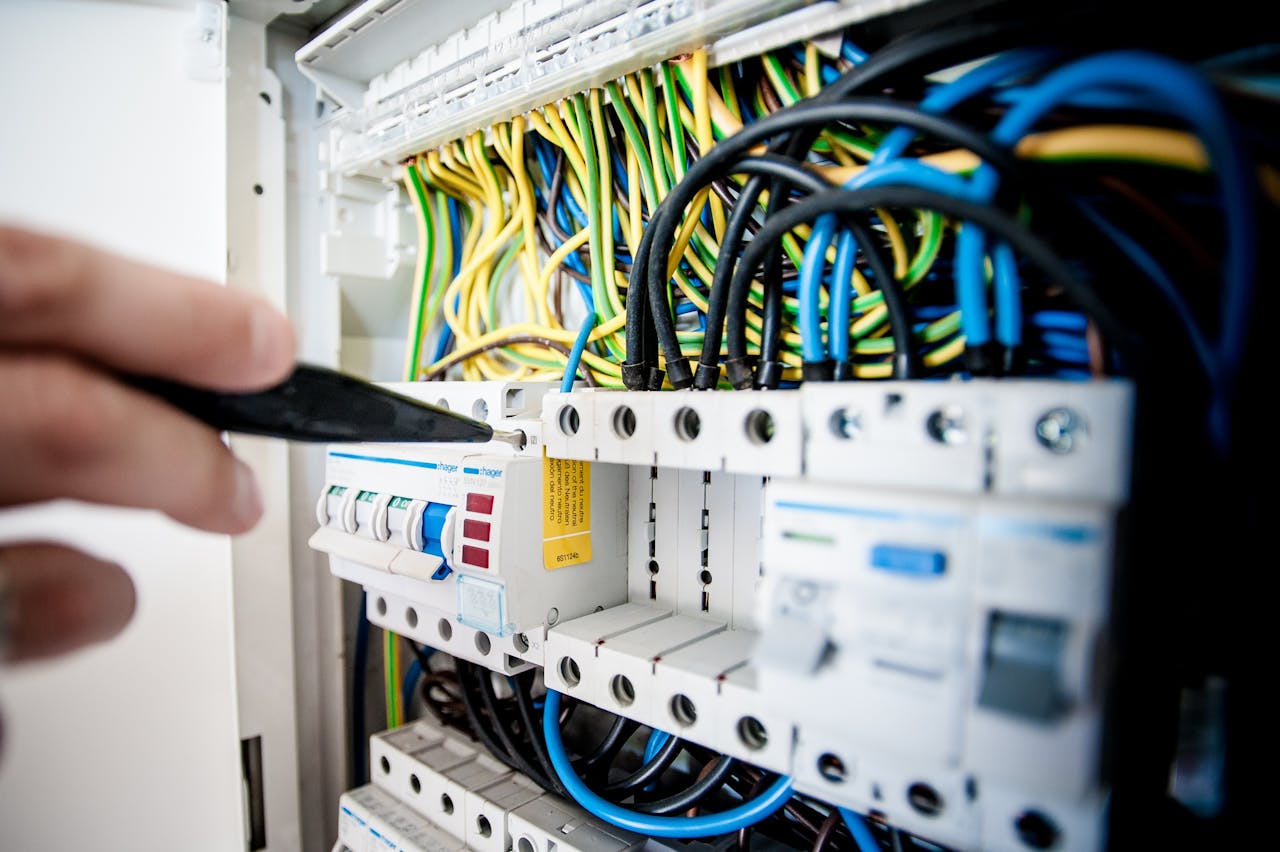
Pre-Rewiring Planning and Preparation
Comprehensive preparation includes property preparation, specification decisions, and logistical coordination ensuring smooth project progression while minimizing disruption and maximizing installation efficiency.
Property Preparation and Access Arrangements including furniture removal, room clearing, and access provision significantly improves working efficiency while reducing professional time charges and project duration.
Adequate preparation includes protecting valuables, clearing work areas, and ensuring unrestricted access to all electrical locations. Professional coordination includes material storage arrangements and daily cleanup procedures minimizing household disruption.
Electrical Specification and Design Decisions including socket placement, lighting requirements, and special circuits should be finalized before work commencement preventing costly changes and ensuring comprehensive provision for all electrical needs.
Specification planning includes future requirement consideration, technology integration, and capacity assessment ensuring adequate provision while controlling costs. Early decision-making prevents project delays while ensuring optimal electrical system design.
Temporary Electrical Arrangements including alternative power provision, lighting arrangements, and essential service maintenance ensure continued occupancy during extended rewiring projects.
Professional coordination includes temporary supply arrangements, daily power restoration, and essential service priority ensuring minimal lifestyle disruption. Temporary arrangements require careful planning while maintaining safety standards throughout installation periods.
Managing Disruption During Rewiring Projects
Effective disruption management maintains household functionality while supporting professional productivity through careful coordination, realistic expectations, and appropriate accommodation arrangements.
Timeline Planning and Occupancy Management includes realistic project scheduling, accommodation arrangements for extended projects, and daily coordination ensuring manageable disruption levels while supporting project completion.
Extended rewiring projects may require temporary accommodation for optimal efficiency while occupied installations require careful daily coordination balancing professional requirements with household needs.
Utility Coordination and Service Continuity includes coordination with utility companies, temporary supply arrangements, and service reconnection ensuring continued essential services throughout complex installation periods.
Professional utility coordination includes supply disconnection scheduling, meter relocations, and final connection arrangements ensuring seamless service transition while maintaining regulatory compliance.
Daily Cleanup and Site Management ensures reasonable living conditions during extended projects while supporting professional productivity through organized work areas and appropriate material storage.
Professional site management includes daily cleanup procedures, dust control measures, and security arrangements protecting both property and installation materials while maintaining reasonable household conditions.
How Long Does It Take and What Benefits Do You Get?
Professional house rewiring provides substantial long-term benefits through enhanced safety, improved functionality, and increased property value while supporting modern electrical demands and ensuring regulatory compliance essential for property marketability.
Safety and Performance Improvements
Modern electrical systems provide comprehensive safety enhancements through current protection technologies, improved materials, and advanced installation techniques significantly reducing electrical risks while improving system reliability and performance.
Enhanced Electrical Safety Standards including RCD protection, improved earthing, and modern circuit protection significantly reduce electrocution risks, fire hazards, and electrical accidents compared to older installations lacking contemporary safety features.
Modern safety systems provide immediate fault detection and power disconnection preventing dangerous conditions while protecting both property and occupants. Professional installation ensures optimal safety configuration while maintaining system functionality and convenience.
Improved System Reliability and Performance through modern cables, enhanced connections, and proper circuit design eliminates common electrical problems while providing consistent, reliable power distribution supporting contemporary electrical demands.
Professional installations include proper load calculation, circuit optimization, and quality materials ensuring long-term reliability while minimizing maintenance requirements. System improvements support modern appliances while reducing energy waste and operational costs.
Future-Proofing and Capacity Enhancement provides adequate electrical capacity for evolving needs including electric vehicle charging, renewable energy integration, and expanding technology requirements supporting long-term electrical adequacy.
Contemporary installations include enhanced capacity planning while providing expansion capability for future requirements. Future-proofing prevents premature system overload while supporting technological advancement and changing lifestyle demands. Planning for electric vehicle charging during rewiring ensures your electrical system is ready for modern transport requirements.
Property Value and Market Benefits
Professional electrical upgrades significantly enhance property market appeal while providing quantifiable value increases through improved functionality, regulatory compliance, and buyer confidence supporting successful property marketing and optimal sale prices.
Market Value Enhancement and Buyer Appeal through modern electrical systems significantly influences property buyer decisions while commanding premium pricing compared to properties requiring electrical upgrades.
Updated electrical systems demonstrate property maintenance standards while eliminating buyer concerns about expensive electrical upgrades. Professional electrical installations often accelerate property sales while supporting asking price achievement through demonstrated quality and compliance.
Insurance and Mortgage Advantages including improved insurance terms, enhanced mortgage availability, and reduced survey issues provide ongoing financial benefits while supporting property marketability and investment protection.
Modern electrical systems often qualify for improved insurance rates while eliminating mortgage survey issues that could complicate property transactions. Professional certification provides insurance company confidence while supporting optimal coverage terms.
Regulatory Compliance and Legal Requirements ensure property legality while supporting rental possibilities, insurance coverage, and future sale transactions through appropriate documentation and certification.
Professional certification provides essential documentation for property sales while ensuring regulatory compliance essential for legal property use. Compliance documentation prevents transaction delays while protecting property value and marketability.
Making Informed House Rewiring Decisions
House rewiring represents significant property investment requiring careful consideration of costs, benefits, and professional selection while ensuring appropriate timing and specification choices that maximize value while maintaining safety and regulatory compliance.
Professional electricians provide essential expertise for comprehensive house rewiring projects, managing complex installations while ensuring safety standards and regulatory compliance throughout systematic upgrade processes. Understanding rewiring requirements, costs, and benefits enables informed decision-making that balances immediate investment with long-term property enhancement and safety assurance.
With typical costs ranging from £4,000-£12,000 depending on property size and specifications, house rewiring provides excellent long-term value through enhanced safety, improved functionality, and increased property marketability that often exceeds investment costs while delivering immediate lifestyle benefits.
Professional rewiring projects require qualified electricians, comprehensive planning, and appropriate preparation ensuring optimal results while minimizing disruption and maintaining safety standards throughout complex electrical installations that support modern living requirements and future electrical demands.